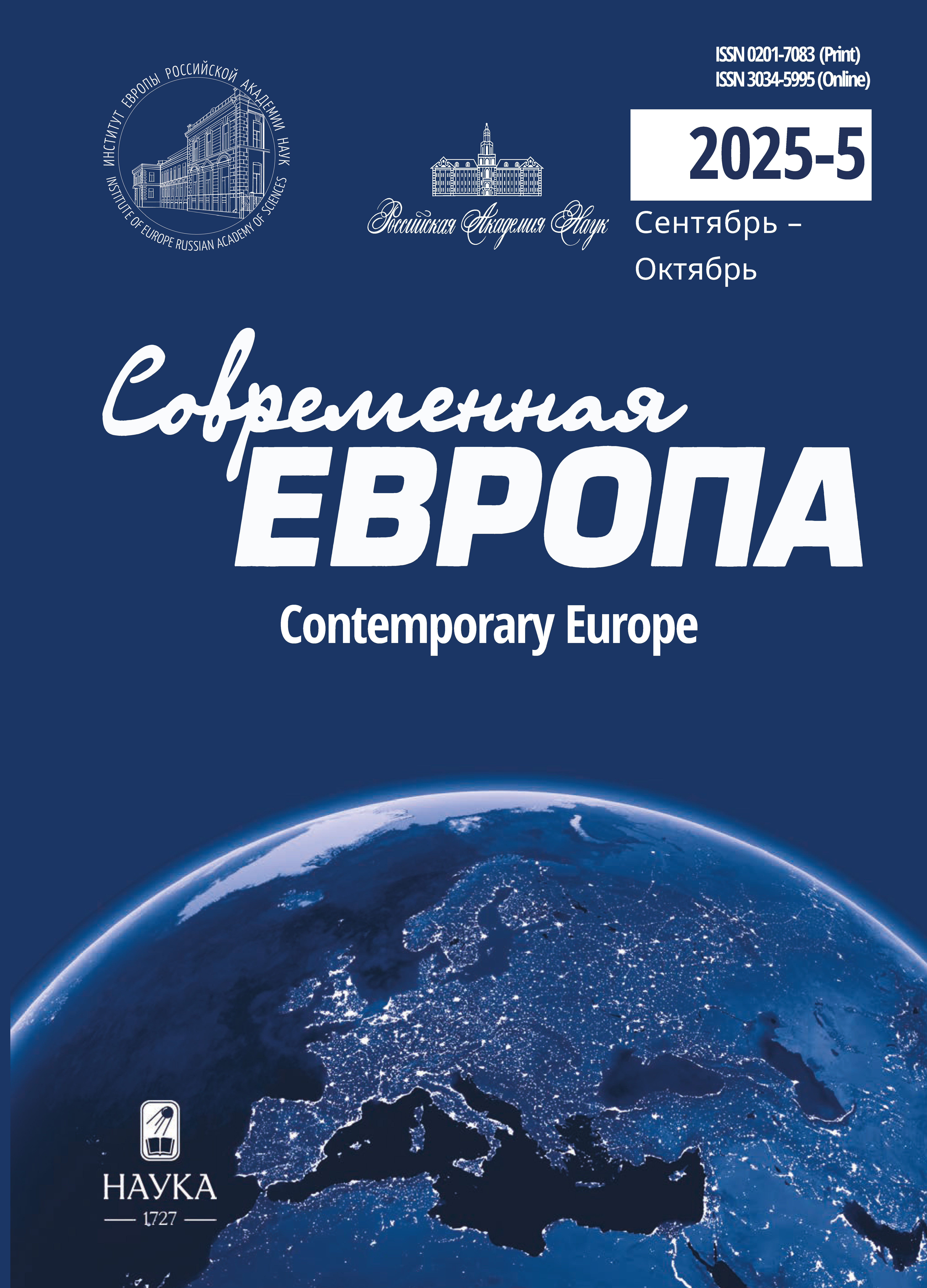ODA Coordination in the EU: Role of European Commission
- Authors: Komissarova Z.N1, Toporikova Y.M2
-
Affiliations:
- MGIMO University
- Primakov National Research Institute of World Economy and International Relations
- Issue: No 5 (133) (2025)
- Pages: 20-34
- Section: EUROPEAN PROCESS: COUNTRIES AND REGIONS
- URL: https://rjpbr.com/0201-7083/article/view/695683
- DOI: https://doi.org/10.31857/S020170832505002X
- ID: 695683
Cite item
Abstract
The growing number of aid donors and the ambiguous impact of this trend on the recipients’ welfare remain relevant both globally and in Europe. The coherence of donors and their actions is one of the ways to overcome the possible repercussions of aid fragmentation. This article examines how the European Commission coordinates Member States and other European donors in delivering aid to developing countries. The authors seek to find new answers to the following questions: how exactly does the European Commission exercise its coordinating role in welfare development policy? Are the Member States themselves interested in this coordination? The study demonstrates the evolution of the European Commission's priorities as aid coordinator from increasing aid effectiveness to accumulating financial resources and responding promptly to crises. The study also elucidates the thesis that the European Commission aspires to strengthen its authority as aid coordinator in Europe to boost its political role. The member states (as well as Switzerland, Norway and the United Kingdom) are really interested in the coordinating role of the European Commission, despite the factors hindering the coherence of European donors (such as differences in priorities and resources, domestic politics, etc.). It is underlined that the scale effect and the recognizable “Team Europe” brand are the key advantages of the European Commission as aid coordinator.
About the authors
Zh. N Komissarova
MGIMO University
Email: z.komissarova@inno.mgimo.ru
Candidate of Sciences (Economics), Associate Professor Moscow, Russia
Ya. M Toporikova
Primakov National Research Institute of World Economy and International Relations
Email: yanatoporikowa@gmail.com
Senior Research Assistant Moscow, Russia
References
- Арбатова Н.К. (2020) Станет ли Европейский союз мировым центром силы? Мировая экономика и международные отношения. Т. 64. № 6. С. 51–65. doi: 10.20542/0131-22272020-64-6-51-65
- Бартенев В.И. (2017) Безопасность или развитие? Современная Европа. № 6. C. 47–57.
- Сергеев Е.А. (2024) Трансформация внешнеэкономической политики Европейского союза в контексте открытой стратегической автономии. Современная мировая экономика. Т. 2. № 2(6). С. 76–91.
- Стрежнева М.В., Руденкова Д.Э. (2016) Европейский Союз: архитектура внешней политики. ИМЭМО, Москва. 135 с. doi: 10.20542/978-5-9535-0480-5
- Сутырин В.В. (2024) Трансформация политики США, ЕС и КНР в области содействия развитию на фоне междержавного соперничества. Международные процессы. Т. 21. № 4. С. 53–82. doi: 10.17994/IT.2023.21.4.75.4
- Шишкина О.В. (2024) Инструменты внешней политики ЕС в странах «Восточного соседства»: от помощи развитию к помощи войне. Вестник МГИМО-Университета. Т. 17. № 6. С. 199–223.
- Bauer M.W., Becker S. (2014) The unexpected winner of the crisis: The European Commission’s strengthened role in economic governance. Journal of European Integration. Vol. 36. No. 3. P. 213–229. doi: 10.1080/07036337.2014.885750
- Carbone M. (2017) Make Europe happen on the ground? Enabling and constraining factors for European Union aid coordination in Africa. Development Policy Review. Vol. 35. No. 4. P. 531–548.
- Delputte S., Söderbaum F. (2012) European aid coordination in Africa: Is the Commission calling the tune? The European Union and global development: An ‘enlightened superpower’in the making? Ed. by St. Gänzle, S. Grimm, D. Makhan. Palgrave Macmillan, London, UK. P. 37–56. doi: 10.13140/RG.2.1.3910.6404
- Delputte S., Orbie J. (2014) The EU and donor coordination on the ground: Perspectives from Tanzania and Zambia. The European Journal of Development Research. Vol. 26. P. 676–691. doi: 10.1057/ejdr.2014.11
- Gehring K., Mikhaelowa K., Dreher A., Spörri F. (2015) Do We Know What We Think We Know? Aid Fragmentation and Effectiveness Revisited. Georg-August-Universität Göttingen Discussion Paper. No. 185. 38 p.
- Haroche P. (2023) A “geopolitical commission”: Supranationalism meets global power competition. JCMS: Journal of Common Market Studies. Vol. 61. No. 4. P. 970–987. doi: 10.1111/jcms.13440
- Håkansson C. (2021) The European Commission’s new role in EU security and defence cooperation: the case of the European Defence Fund. European Security. Vol. 30. No. 4. P. 589–608. doi: 10.1080/09662839.2021.1906229
- Jones A., Teevan Ch. (2021) Team Europe: Up to the Challenge? ECDPM Briefing Note No. 128. 16 p. URL: https://ecdpm.org/application/files/5116/5546/8587/Team-Europe-Up-ToChallenge-ECDPM-Briefing-Note-128-January-2021.pdf (дата обращения: 07.02.2025).
- Keijzer N., Burni A., Erforth B., Friesen I. (2021) The rise of the Team Europe approach in EU development cooperation: Assessing a moving target. Discussion Paper, German Development Institute. Issue 22/2021. 37 p. DOI: https://doi.org/10.23661/dp22.2021
- Klingebiel S., Negre M., Morazán P. (2017) Costs, benefits and the political economy of aid coordination: The case of the European Union. The European Journal of Development Research. Vol. 29. P. 144–159. doi: 10.1057/ejdr.2015.84
- Koch S., Keijzer N., Friesen I. (2024) COVID-19 as a critical juncture for EU development policy? Assessing the introduction and evolution of “Team Europe”. Journal of European Integration. Vol. 46. Is. 4. P. 411–431. DOI: https://doi.org/10.1080/07036337.2023.2299928
- Kugiel P.J. (2020) Towards a Functional Division of Labour in EU development cooperation post-2020. Journal of Contemporary European Research. Vol. 16. Issue 2. doi: 10.30950/jcer.v16i2.1080
- Latek M. (2015) The challenge of coordinating European development policies. European Parliament Research Service, Brussels, Belgium. 25 p. doi: 10.2861/75252
- Steingass S.D. (2018) Federating EU development cooperation? Europe’s contributions to international development effectiveness. PhD Thesis. Cambridge, UK. 255 p.
Supplementary files











